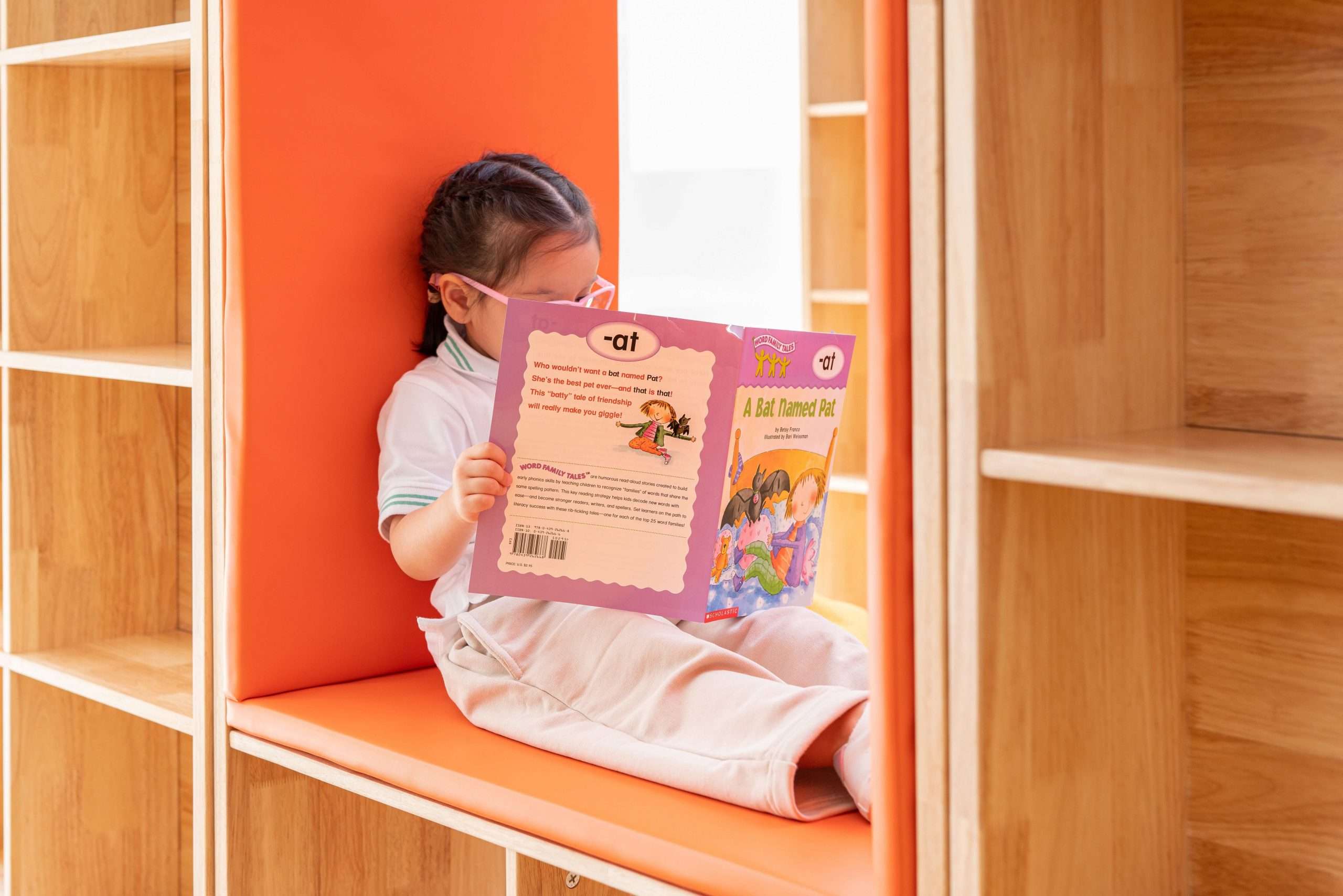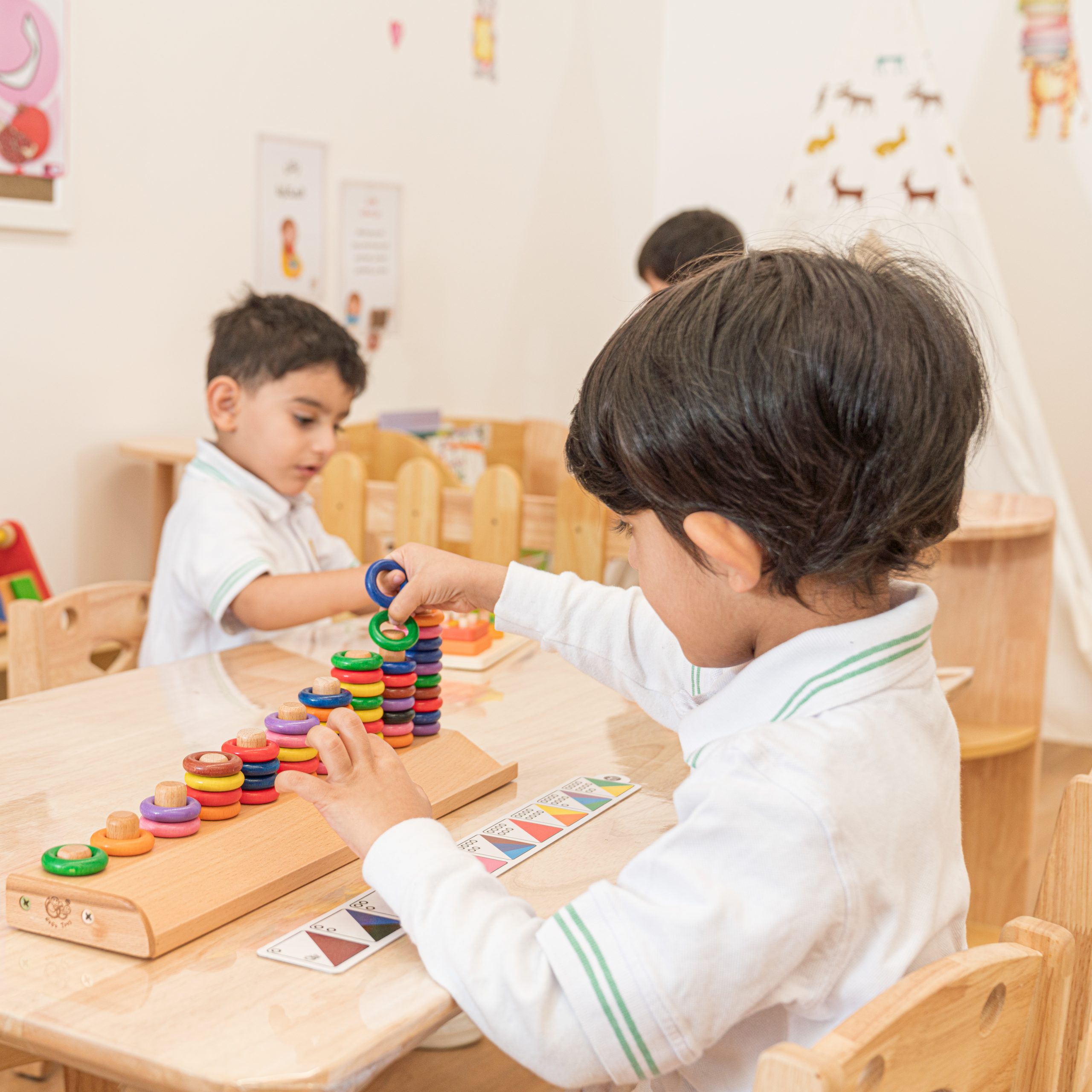Waw “Al-Haal” We build psychological and emotional skills and self-management skills.
Waw “Al-Wasl” We enhance verbal, written, and social communication skills.
Wow “Al-Dahsha”: Our experience is based on education and learning through play and fun.
Waw “Al-Jam'”: Our experience is based on education and learning through play and fun.

In Waw kindergarten, We believe that a child’s early years are the foundation for building their personality and developing their diverse abilities. Therefore, our educational curriculum is designed to be comprehensive and balanced, based on the latest learning theories and developmental characteristics of early childhood.
The curriculum aims to meet the child’s physical, mental, social, and emotional needs, while developing his or her life skills in a flexible and engaging manner, while emphasizing that Arabic is the primary language of communication within the kindergarten.


– Reggio Emilia focuses on learning through discovery and projects.
– Early childhood education standards in Saudi Arabia are aligned with the CCSS: Common Core State Standards for English Language Arts (ELA) and Mathematics.
– NGSS: Next Generation Science Standards for science curriculum, which supports project-based learning in STEM.
Our textbooks and educational materials are used as a support resource in the educational process, but they are not the primary or sole focus. The educational process in our kindergarten relies on sensory experiences, collaborative projects, interaction with the environment, and participation in children’s activities.
● Savvas teaches English and Math in a graded approach aligned with CCSS standards.
● Elite supports children’s learning of English at early levels in an engaging way.
● The creative curriculum is a curriculum that takes into account our curriculum standards and contains various activities that integrate play with learning.
These books are used in a flexible and integrated manner within the classroom, to serve the objectives of existing projects and activities, and to serve as an additional reference that reinforces concepts, rather than a rigid structure imposed on children.
An approach based on learning through projects, play, and exploration.
It focuses on the child as the focus of the educational process, and relies on a stimulating environment, monitoring the child’s behavior, and opening up opportunities for artistic and cognitive expression.
1. Children should have some control over their own learning.
2. Children should be able to learn through experiences of touch, movement, listening, and observation.
3. Children have relationships with other children and with the materials in their space and environment, and so children should be allowed to explore.
4. Children should have endless ways and opportunities to express themselves.
5. Children speak 100 or more languages.
6. The role of the educator is as a collaborator in construction.
7. The environment is considered the third teacher.
8. Learning occurs over long periods of time and is referred to as projects.
9. Relationships and connections between people and place are essential, including relationships with culture, family, and history.
10. Interaction with children is crucial and should reflect best practices.
Arabic language, mathematics, science, arts, Islamic education, stories, sports, cooking, technology, life skills.
All activities aim to enhance language, expression, and imagination, enabling children to impersonate characters, compose stories, and develop self-confidence. The program is implemented through a weekly central story, through which children learn the following:
● Free role-playing
● Creating alternative endings for stories
● Using sight words extracted from the text
● Discussing the author’s works
● Asking questions and generating discussions
Children also visit the library regularly, which includes the following activities:
Storytelling by the teacher: to enhance comprehension, listening, and imagination.
Individual reading of paper books: to encourage the child to choose books and read according to his interests.
Using e-books: To interactively integrate technology into the development of reading skills.
Weekly borrowing system: to strengthen the relationship between the child and the book, and encourage reading at home.
These activities help foster a love of reading, develop independence, and build the habit of reading from an early age.
The curriculum aims to build and develop physical fitness, balance, and motor coordination, as well as promote cooperation and discipline. This is accomplished through daily exercises during morning assembly, in addition to weekly motor skills exercises performed in the gym, according to an age-appropriate curriculum.
Morning sessions include a range of interactive activities aimed at preparing children for the school day and enhancing their self-awareness and cognitive skills. These include:
● Feelings Question: To help children express their emotional state and develop self-awareness skills.
● Review the calendar, time, attendance, and absence:
To reinforce the concepts of time, responsibility, and belonging to the group.
● Plan and schedule weekly tasks: Involve children in determining tasks and activities, which promotes independence and develops organizational skills.
● Kindergarten Rules: Establishing daily rules in a positive manner contributes to building a safe and organized environment and raising behavioral awareness in the child.
● Quranic Surahs
● Prophetic Hadiths, Jurisprudence, and Monotheism
● The Beautiful Names of God
● Values and Behaviors (Character Building Program) presented in a narrative and interactive style.
● Religious Stories
● Experiments and Discovery
● Earth Science
● History
● Scientific concepts related to a child’s life are implemented through age-appropriate sensory experiential activities.
In Reggio Emilia philosophy, the arts are a major means of expression and thought, with the child seen as having “a hundred languages” to express himself, Art is one of these basic languages. Drawing and coloring are not seen as just recreational activities, but as tools used to understand the world, ask questions, explore feelings, and create meaning.
In Waw kindergarten, We offer “The Child’s Right to the Arts,” and the art studio is one of the essential stations through:
● An environment rich in diverse and open materials: such as clay, natural colors, recycled materials, and sensory materials that encourage children to experiment and discover.
●Art projects integrated with academic topics: Arts are a means to understanding concepts, not a separate goal.
●Supportive technical accompaniment: The teacher’s role is to facilitate the artistic process, not direct it, and to listen to the child’s questions and visual attempts to understand the world.
● Documenting and displaying children’s artwork: This enhances the value of the child’s production and builds their self-confidence.
At Waw, we believe that art is not a “lesson,” but rather a language of expression, identity, and thought, And every child has the right to use it in their own way.